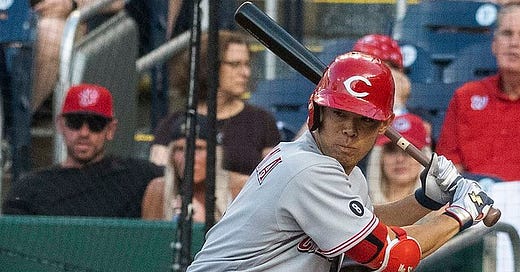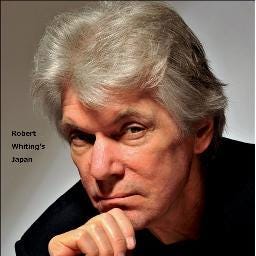Akiyama latest NPB position player unable to make transition to MLB
TOKYO — More than two years ago in the offseason after the 2019 season, the Cincinnati Reds announced the signing of former Seibu Lions outfielder Shogo Akiyama, with great fanfare, to a three-year contract worth $21 million. It was one of the biggest news conferences in franchise history, with several TV cameras and more than three dozen reporters in attendance, most of them from Japan.
Akiyama was a perennial All-Star in NPB and, as the first Japanese player ever to wear a Reds uniform, the Cincinnati franchise envisioned big things for him. They had made a serious attempt at signing Shohei Ohtani, but failed, and thought that Akiyama, a former NPB batting champion, who once hit as high as .358 and had a lifetime batting average of .301, would compensate for that failure. Another Ichiro perhaps.
After all, Akiyama, who was in kindergarten when Ichiro broke the single-season hits record in Japan’s NPB, himself went on to break that record with 216 hits in 2015. In fact, he told reporters, that Ichiro had always served as an inspiration for himself when he thought about playing in MLB. He said he was looking forward to putting up equally impressive hit totals himself in the National League.
But, unfortunately, such was not the case.
In his two seasons with the Reds, Akiyama hit for an average of .224 with a total of exactly zero home runs. He had a negative WAR value of 0.5. He received limited playing time In 366 plate appearances with the Reds, having been given only 33 starts by Reds manager David Bell, who favored outfielder Tyler Naquin instead.
Granted Akiyama, 32, not a good age to go to MLB, suffered injuries, and had to deal with a pandemic shortened season in 2020. But numbers don’t lie. He simply could not hit major league pitching.
Reds analyst Drew Koch noted the following in giving Akiyama grade of a ‘D’':
“Akiyama is in the 53rd percentile in terms of maximum exit velocity. Last season, Akiyama was in the bottom 2% in barrel-rate and the bottom 5% in hard hit percentage. Akiyama is little more than a slap-hitter. Only eight of Akiyama’s 33 hits went for extra bases, meaning 75% of Akiyama’s hit were singles.”
“Now, there’s nothing wrong with making contact and getting on base. Pete Rose made a career of that. But in today’s game, with the defensive shift being so prevalent, you have to find a way to get the ball up and over the infield defenders. Akiyama just isn’t that type of player. “
Akiyama is the just latest position player to move from NPB to MLB and having proven himself incapable of hitting major league fast balls.
Whereas, NPB has many, many pitchers good enough to succeed in MLB — the majority, most agree — because of the intense way Japanese approach the art of pitching with their frequent throwing in practice and nagekomi routines, there are very few batters capable of making the adjustment.
“Only a handful,” says a scout I know. “There are so many pitchers that throw the ball at 100 MPH in MLB and Japanese batters in NPB are not used to such high speeds.”
As Warren Cromartie once put it “to succeed in MLB, a batter from Japan has to up his bat speed and reaction time a notch or two. The NPB game is just too slow, at least in comparison to MLB pitching.”
There is a long history of flops. One after another big name NPB position players have gone to the MLB and failed miserably, most notably Tsuyoshi Nishioka and Hiroyuki Nakajima, who signed contracts worth millions of dollars and spent most of their time in the minor leagues. There were exceptions like Ohtani, Ichiro, and Hideki Matsui — who had a rough start but learned to ‘up’ his swing. There was also Norichika Aoki and, in particular, Tadahito Iguchi who did well. Playing second base and batting leadoff, Iguchi helped the Chicago White Sox win the 2005 World Series and White Sox manager Ozzie Guillen said of him, “He’s the team’s MVP.”
However, too many big name position players hit a wall.
Kazuo Matsui, for example, was chosen in a turn-of-the-millennium survey in Japan as the best shortstop in NPB history. He was 28 when he joined the New York Mets in 2004 and when he arrived in spring camp he was hailed by the New York media as the next big thing from the Far East. But the man with the multiple hair colors, had difficulty making the shift from fielding ground balls hit on artificial turf, as he had experienced with Seibu, to fielding balls hit on natural grass at Shea Stadium, which made the ball take different spins and hops.
He was also afraid, it was apparent, of the high inside MLB fastball, afraid of the hard slide by big, burly MLB base runners coming into second base, and afraid of MLB sports writers, hiding daily behind his entourage. He failed miserably and become one of the most disliked players in the recent history of New York sports, before redeeming himself in Colorado and Houston,
Norihiro Nakamura also had his problems, the former slugger of the Osaka Kintetsu Buffaloes, could not adjust his bat-on-the-helmet hitting form in order to hit the MLB fastball, and could not even keep a spot on the L.A. Dodgers bench. Kosuke Fukudome, who signed with the Chicago Cubs for $48 million over four years, was also a big disappointment. He was vastly overpaid and never approached the statistics he produced with the Dragons, mostly notably in 2006 when he hit .351 with 31 homers and 104 RBIs to win the CL MVP. Kenji Johjima. Remember him? He signed for big money in Seattle but was then reduced to being a bench warmer and quit. Yoshitomo Tsutsugo? Two bad years (but with possible redemption on the horizon with Pittsburgh).
I don’t know what the solution is. Lacking many 100-mph pitchers, how about practicing a pitching machine that throws the ball at 110 miles per hour to prepare Japanese hitters for the big leagues?
Of course, none of these failed players mentioned above have had to worry about going broke. Big money contracts awaited them in Japan, such as the four-year, $24 million deal Johjima subsequently got from the Hanshin Tigers.
Shogo Akiyama, a nice guy with a nice family, deserves better. I’m sure he will find a home back in the NPB.





